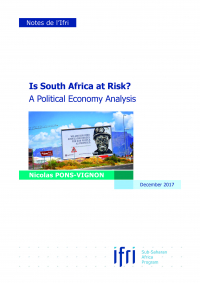Gateway to Think Tanks
| 来源类型 | Publications - Policy Papers |
| 规范类型 | 简报 |
| DOI | 978-2-36567-811-7 |
| Is South Africa at Risk? A Political Economy Analysis Notes de l'Ifri, December 2017 | |
| Nicolas PONS-VIGNON | |
| 发表日期 | 2017-12-15 |
| 出版年 | 2017 |
| 概述 | The President, Jacob Zuma, replaced his respected Minister of Finance, Pravin Gordhan, on the 30th March 2017. It was the second attempt in two years (this time successful) to put an official in this key position who is "acquiescent" to the president's projects. |
| 摘要 |
Is South Africa at Risk? A Political Economy Analysis Notes de l'Ifri, December 2017
The President, Jacob Zuma, replaced his respected Minister of Finance, Pravin Gordhan, on the 30th March 2017. It was the second attempt in two years (this time successful) to put an official in this key position who is "acquiescent" to the president's projects.  The immediate consequence of this cabinet reshuffle was the lowering of the South African debt rating to the "junk" status by Standard & Poor's and Fitch. Despite many calls to resign, President Zuma managed to stay in office, partly due to the mobilisation of disparate supporters. Nevertheless, South Africa is in a very difficult situation, both from an economic and social point of view. In order to shed some light on the current crisis, it is necessary to revisit the marked deterioration in social relations since 1994, with an increase in "bottom up" protests, which culminated with the expulsion of the main trade union, the National Union of Metal Workers of South Africa (NUMSA), from the Congress of South African Trade Unions (COSATU) in 2015. We will demonstrate that the South African stalemate is the result of adopting neoliberal policies masked by a rhetoric claiming that growth and poverty reduction are at the heart of the government's project. However, the Republic of South Africa (RSA) cannot in any case be considered as a developmental state in the sense of the East Asian "tigers", and has experienced growth-reducing structural change (characterized by an early de-industrialization process). We will also discuss the growing inequalities since the 1990s, invalidating the idea, dear to the ANC that the country is seeking to emulate the northern European welfare state model. In a context of extremely high structural unemployment, the main source of mutual aid is private and is made up of transfers between households. The adoption of a national minimum wage of R 3,500 per month (around € 250), due to come into effect in 2018, is a positive step, albeit too late. Indeed, the consequences of weak growth and the build-up of frustration since 1994 could well plunge the country into a serious political and economic crisis.
Is South Africa at Risk? A Political Economy Analysis.pdf
|
| 关键词 | African National Congress ANC Jacob Zuma South Africa |
| URL | https://www.ifri.org/en/publications/notes-de-lifri/south-africa-risk-political-economy-analysis |
| 来源智库 | French Institute of International Relations (France) |
| 引用统计 | |
| 资源类型 | 智库出版物 |
| 条目标识符 | http://119.78.100.153/handle/2XGU8XDN/416346 |
| 推荐引用方式 GB/T 7714 | Nicolas PONS-VIGNON. Is South Africa at Risk? A Political Economy Analysis Notes de l'Ifri, December 2017. 2017. |
| 条目包含的文件 | ||||||
| 文件名称/大小 | 资源类型 | 版本类型 | 开放类型 | 使用许可 | ||
| notes_couv_afrique_d(28KB) | 智库出版物 | 限制开放 | CC BY-NC-SA |  浏览 | ||
| ponsvignon_south_afr(1525KB) | 智库出版物 | 限制开放 | CC BY-NC-SA | 浏览 | ||
除非特别说明,本系统中所有内容都受版权保护,并保留所有权利。